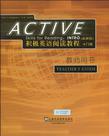积极英语阅读教程
2010-2
上海外教
(美)安德森
64
《积极英语阅读教程》是一套培养英语阅读理解能力、训练词汇技巧的系列教材,共分5个级别,包括预备级和1—4级,适合外国语学校、外语特色学校及重点中学使用。这套最新版教程的教师用书与第一版相比,优势更为突出:教学步骤设计更具体、更合理,并进一步补充了语言和文化知识。 本册为教师用书,入门级,最新版。
尼尔·J·安德森是阅读教学方面的专家,本书采用了他设计的ACTIVE阅读法,帮助读者成为更自信、更独立——也是更积极的英语阅读者。
Frequently Asked QuestionsUnit Walkthrough: Getting ReadyUnit Walkthrough: Chapters 1 & 2Unit Walkthrough: Real Life Skill & What Do You Think?Using the Audio ComponentReview Units and Activities for Building Reading RateUnit 1: Living OnlineUnit 2: Study and EducationUnit 3: Work ChoicesUnit 4: The World of Sports Unit 5: TravelUnit 6: Cultural DifferencesUnit 7: Rules, Rules, Rules Unit 8: Remarkable PeopleUnit 9: That's Entertainment Unit 10: Fashion and TrendsUnit 11: A Funny WorldUnit 12: True Life StoriesReview Unit 1Review Unit 2Review Unit 3Review Unit 4IPA Chart and TOEFLR iBT Reading Skills
Integrated Skill Extension: Hidden TalentsStudents describe their hidden talents and what they could do with them. 1. Explain that many people have talents or skills that are different from what they actually study or do for a job. Ask the class to pretend that they could study or do anything they wanted. What talents would they choose to develop? How and where could they do that? 2. Allow a few minutes for each student to think about their talents and write a list of possibilities. 3. Then ask for volunteers to tell about their "dream job." Remember that some students will be shy and not willing to talk about their hidden talents. Other students will be quite eager to share their dreams. 4. Give examples such as television anchor person, sports car test driver, or fashion designer.Reading Skill Extension: Reading LogStudents keep a log for three days of everything they read. They note the purpose of each reading. 1. Elicit from the class all the types of reading a person might encounter in a particular day. Give examples such as: labels on breakfast cereal, a bus timetable (buses stop running at midnight), care instructions on clothing (wash in cold water), a text message, road signs (no left turn), software instructions (click to continue), a menu and prices in a restaurant, a map with directions to a party, an advertisement for running shoes, etc. in addition to more usual types of reading such as books and magazines. Discuss what special reading skills are required for some of these tasks (understanding food values such as calories, using short forms in text messaging such as BTW for by the way, and reading map symbols.) 2. Tell the class that for three days, each person will keep a log or record of everything they read as well as the purpose of that reading. The notes can be very brief, since the purpose of the exercise is to make students aware of the importance of reading as an everyday activity.3. At the end of the three days, ask students to work in groups of four to compare their reading logs. What types of reading overlapped with others in their group? What kinds were unique or special? Why? 4. Ask if anyone read in a language other than their first language. If so, what language(s)? 5. Did students use quick reading strategies such as skimming (for general meaning) or scanning (to find specific information) for any of their reading? Ask them to explain situations where this was useful.Listening/Speaking Skill Extension: Intemational Trade BrainstormStudents brainstorm about things their country imports and exports.1. Ask students to think of products that they use that come from other countries. Which countries do they come from? Can they locate these countries on a world map? How are they shipped?2. Does their country export things to other countries? Ask for examples of exports.

Of great benefit to high school students1
下订单后 ,很快就收到货了 , 服务也很好 , 继续支持!